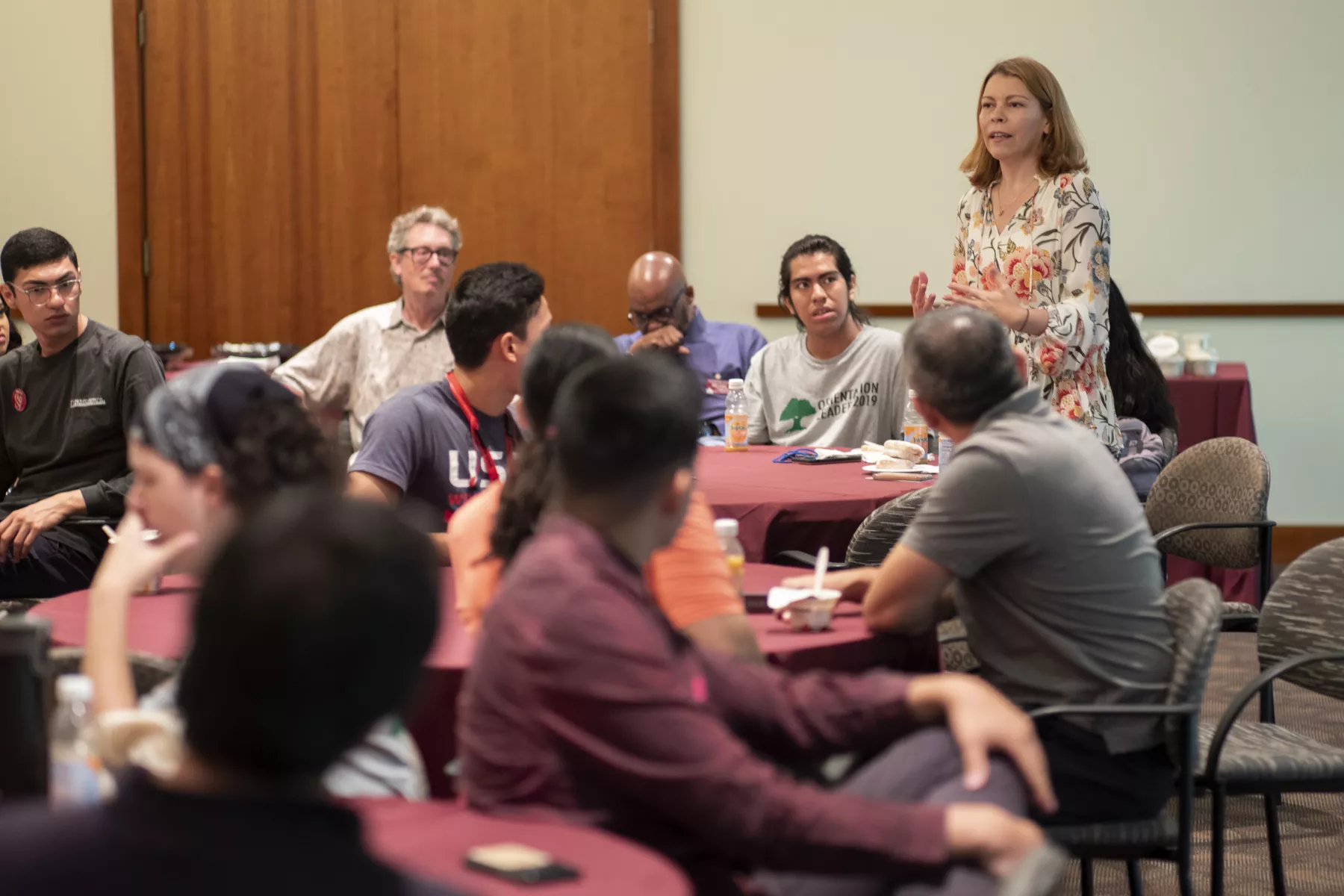Academic Program

Professor Désirée Díaz at the Swarthmore Reception for Latinx Families.
All students pursuing a course major, course minor, Honors major, or Honors minor in Latin American and Latino must meet the following two requirements:
Language
Students must successfully complete SPAN 004 (Advanced Spanish) or show equivalent competency in a Latin American language. This requirement is waived for native and heritage speakers of Spanish, and for students who demonstrate sufficient competence in either Spanish or another Latin American language (including Portuguese and relevant indigenous languages), as determined by the Latin American and Latino Studies Committee. Note: LALS credit is not offered for language courses.
Engaged Learning
Students are required to spend at least one semester engaging in an immersive experience off campus. By extending learning beyond the traditional classroom, students have distinctive opportunities for enriching intellectual experiences and unique opportunities for personal growth. There are two ways to fulfill this requirement: (1) Studying abroad for a semester in a program approved by the LALS coordinator and Office of Global Engagement or (2) Completing a summer internship or service project in Latin American or in a Latinx community in the United States, as approved by the LALS coordinator.
Students are encouraged to discuss this requirement with the LALS coordinator, who can offer advice about both study abroad programs and how to find internships and apply for summer scholarships to support internships offered by the Lang Center and Provost’s Office. Note that students on financial aid may apply that aid to designated programs of study abroad and should consult with the Office of Global Engagement for details.
Students choosing the study abroad option should be mindful of the following: Study abroad must be pursued in Spanish or Portuguese. Students should fulfill the LALS language requirement (SPAN 004 or equivalent) before going abroad. With respect to courses taken abroad, students may apply up to two such courses toward the LALS major or minor. Those courses must be approved by the LALS coordinator as having sufficient LALS content to qualify. Language courses are not available for study abroad credit. Students are strongly encouraged to complete the introductory course requirement (see below) prior to their immersive off-campus learning experience.
Course Major
In addition to fulfilling the language and immersive experience requirements, students pursuing a LALS course major must meet the following requirements:
- Take a minimum of eight credits that are LALS-listed or LALS-eligible.
- One of those eight must be LALS 010 (“Introduction to Latin American and Latino Studies”).
- One of the eight must be a one credit senior thesis, which serves as the senior comprehensive exercise.
- Of the other six credits, at least one must be in the SS division and one in the HUM division.
Course Minor
In addition to fulfilling the language and immersive experience requirements, students pursuing a LALS course minor must meet the following requirements:
- Take a minimum of five credits that are LALS-listed or LALS-eligible.
- One of those five must be LALS 010 (“Introduction to Latin American and Latino Studies”).
- Of the other four credits, at least one must be in the SS division and one in the HUM division.
Honors Major
In addition to fulfilling the language and immersive experience requirements, students pursuing a LALS Honors major must meet the following requirements:
- Take a minimum of ten credits that are LALS-listed or LALS-eligible.
- One of those ten must be LALS 010 (“Introduction to Latin American and Latino Studies”).
- Six credits must consist of three two-credit Honors preparations. These can be Honors seminars that are LALS-listed (e.g., POLS 109, HIST 149, REL 109, SPAN 103, SPAN 108). Students will have the option of doing a two credit honors thesis as one of the three preparations. Students declaring a LALS Honors major but also declare an Honors minor in another department.
- Of the nine credits beyond LAL 010, at least one must be in the SS division and one in the HUM division.
Honors Minor
In addition to fulfilling the language and immersive experience requirements, students pursuing a LALS Honors major must meet the following requirements:
- Take a minimum of five credits that are LALS-listed or LALS-eligible.
- One of those five must be LALS 010 (“Introduction to Latin American and Latino Studies”).
- Two credits must consist of a LALS-listed two credit honors seminar (e.g., POLS 109, HIST 149, REL 109, SPAN 103, SPAN 108). This seminar cannot be offered within the department of the student’s Honors major
Additional Policies Relevant for All Majors and Minors
- Students in the graduating class of 2025 may substitute a different course for LALS 010 in consultation with the LALS coordinator if they did not have the ability to fit it into their schedules in the two years it was offered.
- Only one of the five courses used for a LALS minor may overlap with a student’s major or other minor.
- A maximum of two credits from outside Swarthmore (ie, from study abroad or classes taken at TriCo institutions) can be applied to any LALS major or LALS minor.
- To be eligible for the major or minor, all students must maintain a minimum grade of “B” in the program and a “C” average in any other course work.



